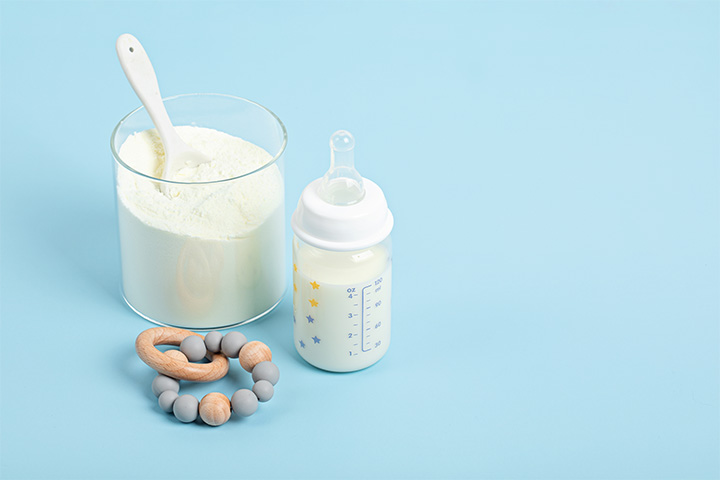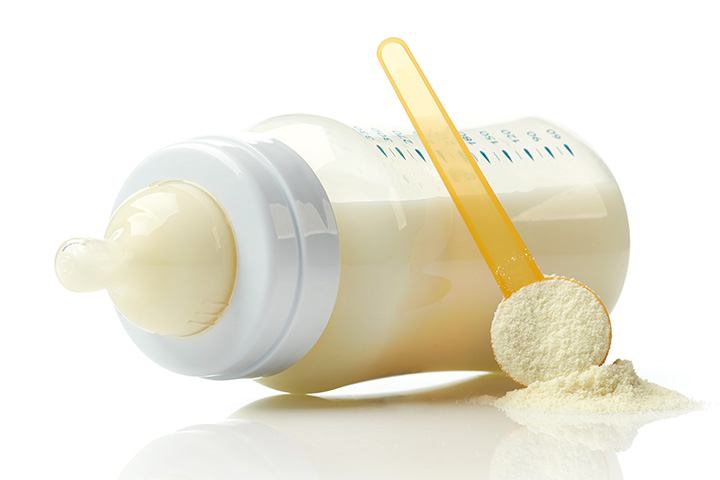
Image: Shutterstock
Entering parenthood, your foremost concern is ensuring optimal nutrition for your baby. In the realm of feeding choices, organic baby formula has garnered considerable interest due to its potential advantages. Within this article, we will explore the realm of organic baby formula, delving into essential queries and aiding you in making well-informed choices to safeguard your little one’s health and happiness. Read on!
What’s In Organic Baby Formula?
Image: Shutterstock
Organic baby formula is carefully crafted to achieve the nutritional composition of breast milk. It is made from high-quality, organic ingredients that are free from synthetic pesticides, antibiotics, and growth hormones. The primary components of organic baby formula include:
1. Protein
Organic baby formula typically contains protein from organic cow’s milk or plant-based sources such as soy or rice protein (1). The protein content is crucial for your baby’s growth and development.
2. Carbohydrates
有机婴儿配方奶粉富含有机碳水化合物ohydrates, usually in the form of lactose, which is the natural sugar found in breast milk (2). Carbohydrates provide a valuable source of energy for your baby’s activities and growth.
3. Fats
Healthy fats, including essential fatty acids like DHA and ARA, are vital for brain development and overall health. Organic baby formula often includes organic vegetable oils to provide these essential nutrients (3).
4.维生素And Minerals
Organic baby formula is fortified with essential vitamins and minerals, including calcium, iron, and vitamin D, to support your baby’s bone health, immunity, and overall growth (4).
Is Organic Baby Formula Worth It?
Image: Shutterstock
Deciding whether to embrace organic baby formula is a personal journey, shaped by various factors like your values, beliefs, and financial considerations. While organic baby formula boasts potential advantages, it’s important to recognize that both organic and conventional formulas adhere to rigorous testing and stringent regulations to meet exacting nutritional benchmarks.
For numerous parents, the allure of organic baby formula lies in its potential to mitigate exposure to potentially harmful chemicals frequently associated with conventional farming practices. Organic agriculture’s core principles center around curbing the use of synthetic pesticides, antibiotics, and genetically modified organisms (GMOs), thus resonating with parents who prioritize eco-friendly and natural choices.
Nevertheless, the decision hinges on a balance between these potential benefits and the associated costs, as organic baby formula often carries a heftier price tag than its conventional counterparts. Engaging in a thoughtful discussion with your pediatrician becomes pivotal, as their insights can be tailored to your baby’s unique requirements and your family’s specific circumstances. In doing so, you navigate the path towards making a well-informed choice that resonates with your values while ensuring your baby’s optimal health and nourishment.
Choosing Between Organic Baby Formula Brands:
Image: Shutterstock
Navigating the world of baby formula brands can be overwhelming, especially when choosing organic options. To make an informed decision, consider the following factors:
1. Ingredients
Carefully examine the ingredient list of different organic baby formula brands. Look for recognizable, organic ingredients without unnecessary additives or fillers.
2. Certification
Check if the organic baby formula is certified by a reputable organic certification body. Certifications such as USDA Organic ensure that the formula meets strict organic standards (5).
3. Nutritional Content
Compare the nutritional profiles of different brands to ensure they provide the necessary nutrients your baby needs for healthy growth and development.
4.Special Dietary Needs
If your baby has specific dietary needs or allergies, consult with a healthcare professional to find a suitable organic formula that meets those requirements.
5. Taste And Acceptance
Babies have preferences too! Some brands offer sample sizes or trial packs, allowing you to see which formula your baby prefers before committing to a larger purchase.
Addressing Concerns And Misconceptions
Image: Shutterstock
When considering organic baby formula, it’s important to address common concerns and misconceptions that may arise. Some parents worry that organic formulas may not provide adequate nutrition compared to their conventional counterparts. However, it’s crucial to understand that organic baby formulas undergo rigorous testing to meet the same nutritional standards as non-organic options. Regulatory bodies ensure that both types of formulas provide essential nutrients necessary for your baby’s development.
Another common misconception is that organic baby formula is the only option for parents seeking a healthier choice. While organic formulas offer benefits such as reduced exposure to certain chemicals, conventional formulas also undergo stringent quality control and safety measures. These formulas are designed to provide balanced nutrition for infants who may not tolerate or have access to breast milk.
Ultimately, the decision between organic and conventional baby formula should align with your family’s values and circumstances. Consulting with your pediatrician and conducting thorough research can help you make an informed choice that best suits your baby’s nutritional needs and your own preferences.
As you embark on your parenting journey, your pediatrician is a valuable resource for guidance. They offer tailored advice based on your baby’s needs and your family’s situation. Whether you choose organic or conventional formula, remember that providing your baby with love, care, and nourishment is what truly matters for their growth and well-being.
















